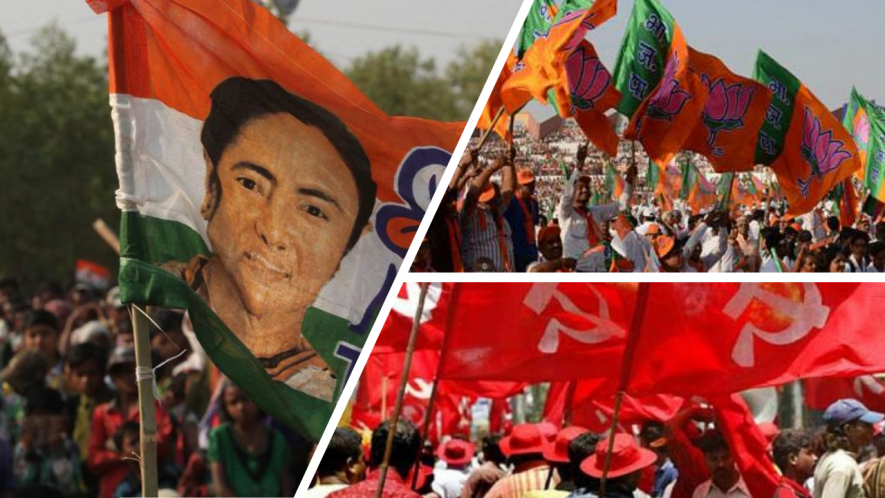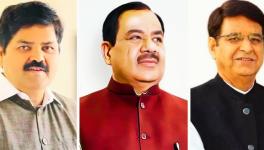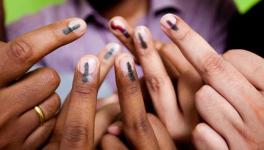‘Palpable Curiosity about West Bengal Polls in Bangladesh’: Dhaka Intelligentsia

Call it curiosity or interest, it is visibly palpable in Bangladesh as people await the outcome of the West Bengal Assembly elections, which will have its sixth phase on April 22 and conclude on April 29. The counting for the West Bengal polls will take place simultaneously with Assam, Kerala, Tamil Nadu and Puducherry on May 2.
Assembly election in West Bengal always evokes interest in Bangladesh as Assembly election in Tamil Nadu generates curiosity in Sri Lanka -- in both cases it is due to historical reasons. But the interest in Bangladesh about the West Bengal Assembly election this time round is certainly more than before. In this context, uncertainties and apprehensions are marking the assessments being made in “that side of Bengal”.
NewsClick spoke on the subject of the West Bengal Assembly election to two prominent faces of the Bangladeshi intelligentsia and a city-based leader of the Communist Party of India (Marxist). A core concern they share is whether the election outcome will change the course of history and West Bengal’s core identity “as an inclusive, tolerant, and progressive society.” The persons NewsClick spoke to are Prof Syed Munir Khasru, who chairs Dhaka-based Institute for Policy, Advocacy, and Governance (IPAG); Prof Mustafizur Rahman, Distinguished Fellow at the Centre for Policy Dialogue (CPD) in Dhaka and the CPI(M)’s Bikash Ranjan Bhattacharya, who is a Rajya Sabha member and a prominent lawyer in Kolkata.
It becomes obvious as the conversation progresses that the visible curiosity, the visible interest in West Bengal’s election this year is because of the aggressive efforts of the Bharatiya Janata Party (BJP) to wrest power and form its maiden government in the state. The incumbent Trinamool Congress (TMC), under the leadership of fiery Chief Minister Mamata Banerjee, is trying hard to defend its rule for the second time. The Sanjukta Morcha of the Left, the Congress and the fledgling Indian Secular Front of Furfura Sharif cleric Abbas Siddiqui is also emerging as a counter force. Overall, it has become a high profile contest in which Mamata’s TMC is facing serious challenge from the BJP – a situation she did not have to encounter in 2011 and 2016; this is what makes 2021 so different and warranting close watch in the neighbouring nation.
According to Khasru of the IPAG, even in “normal” times, there is interest in Bangladesh about an Assembly election in West Bengal because of very old, deep-rooted social connection between what is often referred to as ‘Epar Bangla, Opar Bangla’ – Bengal this side and Bengal that side. This is despite the Partition and the persisting unease, and, if one may say, irritation in Bangladesh over pending matters. Thousands of Bangladeshis visit Kolkata for medical treatment. A good number of students go to the Indian state for studies every year. For Bangladeshi tourists, it is a favourite destination. The real underlying reason is the affinity factor -- “our people feel they they are welcome in West Bengal, where our people do not experience any barrier,” Khasru observed while speaking to NewsClick from Dhaka.
Inquiries from informed quarters suggest that Kolkata’s private healthcare sector has a respectable share of patients coming from the neighbouring country. Most of them come for treatment of cancer and cardiac, orthopaedic and kidney ailments. There is also a sizeable number of women from that country coming to Kolkata for treatment of reproductive and fertility issues. The relatively affluent ones get high-end surgeries and procedures done in the city, which bolsters the revenues of the top hospitals.
Bangladeshi students are sent to Kolkata by their guardians for studies in various courses at well-known institutions, including Viswa Bharati University, whose design courses are one of the top attractions. Then, there are scholarship programmes under which such students come and West Bengal remains a prominent destination for studies. Moreover, a large number of people visit the eastern Indian state to visit their friends and relatives who are their extended family members. Thus, the hospitality outfits, particularly the budget ones, in West Bengal, are assured of a chunk of their business from Bangladesh under normal circumstances.
Among the reasons for disquiet in Bangladesh are the long-pending Teesta water sharing treaty and the two citizenship legislations – the Citizenship (Amendment) Act 2019 and the proposed National Register of Citizensn. Automatically, names of two politicians crop up in this regard – West Bengal’s chief minister Mamata Banerjee in the case of Teesta waters and Union Home Minister Amit Shah in the case of the citizenship legislations. “When in Bangladesh, Banerjee will say: ‘Count on me’, but she has not done anything. She has no credibility in our country,” Khasru said.
Shah’s recent remark about poor Bangladeshis from border districts entering India has provoked sharp reactions in Dhaka. When pointed out that Indian political leaders making controversial statements during poll campaigns often take refuge in the argument that such ‘illegal migrants’ issue should be seen as election-time rhetoric. On the other hand, Dhaka has been assured by New Delhi that the citizenship legislations are India’s domestic matter. The IPAG chairman said, “They are doing their job, we are doing our job.”
Rahman of the CPD suggested that there is concern in his country about the electoral outcome in West Bengal. If after Assam in 2016, the BJP is able to realise its political ambition in West Bengal in 2021, there will be worries in Bangladesh about the direction in which matters will move in West Bengal.
Bangladesh has earmarked two (at Chittagong and in Kusthia) of the proposed 100 special economic zones for Indian investors. There are several road, rail connectivity and coastal shipping schemes on which the two countries have to move together. These will facilitate faster two-way goods movement to the benefit of both countries and India’s north-eastern region in particular. If uncertainties loom post-results, the connectivity programmes are bound to suffer, Rahman told NewsClick from Dhaka.
Bhattacharya, the CPI(M) leader, agreed that the situation that has developed in West Bengal this election season will naturally cause concerns in Bangladesh. “People in that country have seen what happened in Assam after the BJP captured power in that state in 2016. The affinity between Bangladesh and West Bengal for reasons of language and ethnicity is a fact of life. If a party wedded to religious polarisation assumes power in West Bengal, there is bound to be ramifications for Bangladesh where too there are fundamentalist forces and those forces will seek opportunities to proclaim their presence,” Bhattacharya told NewsClick. On this point, Rahman tended to agree with the CPI(M) leader and said that the rise of communal and divisive forces in West Bengal will act as an impetus to the anti-India forces in his country.
Significantly, the concern articulated by Khasru in an article in The Hindu edition of April 19 reads : “... being a moderate, progressive Muslim majority country, the concern on this side of the border is whether a BJP win will divert the course of history and dilute West Bengal’s core identity as an inclusive, tolerant, and progressive society.”
On the electoral verdict, his thinks whatever it is, “there is no apparent reason to feel either euphoric or optimistic on this side of the border.”
Get the latest reports & analysis with people's perspective on Protests, movements & deep analytical videos, discussions of the current affairs in your Telegram app. Subscribe to NewsClick's Telegram channel & get Real-Time updates on stories, as they get published on our website.
























